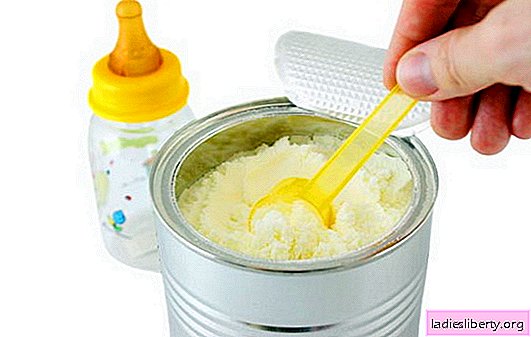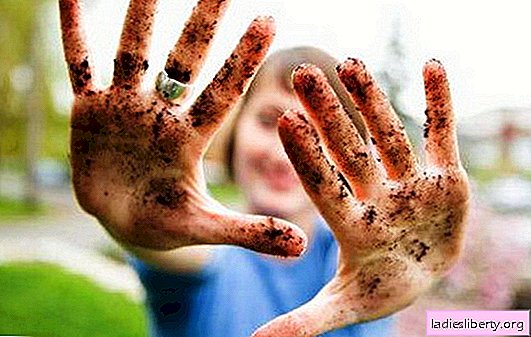
In summer, excessive sweating gives us a lot of trouble: from sticky spots on your favorite T-shirt to an unpleasant smell. To cope with this delicate problem, you need to conduct an offensive on several fronts.
In the same conditions, different people sweat with different intensity. On a hot summer day in a stuffy bus, one person will get off with a few drops of sweat, while the other will be poured from a bucket. It's all about natural data and genetics. Therefore, everyone chooses a method of struggle according to the characteristics of his body.
Why do we sweat
Although for many people, sweating is a rather unpleasant aesthetic defect - this is a very important biological process. Sweating helps our body maintain the required temperature and prevents overheating. When evaporating, sweat cools the skin during physical exertion, nervous tension, or heat. Our body produces sweat when we are under stress or undergo hormonal changes.
Under normal conditions, the human body produces about 1 liter of sweat per day. We do not notice this, because most of the liquid evaporates instantly. During physical exertion, heat or stressful situations to cool the body, our body can release up to 10 liters of sweat per day.
But wet spots on a t-shirt are not so terrible as an unpleasant smell. Scientists say that usually the sweat itself does not smell, and the bacteria that actively propagate are the culprits of the unpleasant smell. Therefore, for a healthy person enough compliance with the rules of hygiene and the use of deodorant. If such measures do not help, you need to look for the cause of the failure.
A strong smell of sweat may indicate malfunctions in the endocrine and nervous systems. Even banal gastrointestinal disorders can cause such an unpleasant problem. If the hands and feet sweat the most, this is an alarming bell of the body that indicates nervous overloads.
What increases sweating

1. In the heat it is better to abandon synthetics - it does not let moisture through. This creates a greenhouse effect on the skin and makes us sweat more intensely. Prefer natural fabrics - cotton, silk, chiffon.
2. Caffeine. This substance stimulates all body systems. From the intense blood flow, we begin to sweat. Of course, no one agitates you to abandon this invigorating drink at all, but try not to use it during the day.
3. Alcohol. Perhaps a mug of beer and quench your thirst on a hot day, but make you sweat well. On a hot day, give preference to non-alcoholic cool drinks.
4. Spicy and hot food. Kharcho soup is not the best menu for a summer day. In order not to stimulate the sympathetic nervous system, which is responsible for perspiration, give up garlic, ketchup, pepper, coriander, ginger, pork and chocolate temporarily.
5. Anxiety, anxiety. Even the slightest nervous tension can cause the sweat glands to work too intensively. To calm your mind, do yoga or auto-training.
When to see a doctor
Sweating, especially on hot summer days, is perfectly normal. But if you noticed that you began to sweat much more, there was an unpleasant smell - sign up for a consultation with a doctor. Excessive sweating may be secondary hyperhidrosis - anomalously active sweat glands due to failures in the body. This condition can be caused by stress, disturbances in the work of the nervous or endocrine system, infections.
Antiperspirant - effective sweat protection

If the deodorant just muffles the smell of sweat, but the antiperspirant acts more radically - it prevents the secretion of sweat. The composition of antiperspirants include compounds of zinc and aluminum, which clog the sebaceous glands. The body continues to produce sweat, but the liquid does not reach the surface of the skin.
Recently, many argue that the use of antiperspirants is harmful to human health. After all, the toxins that should come to the surface of the skin along with then remain inside. This is only partly true. If you use the antiperspirant correctly, there will be no harm. The product should be applied to clean, dry skin and be sure to rinse off after 6-8 hours. After using an antiperspirant, your skin should rest for a few hours.
Now there is a large selection of both perfume and medical antiperspirants. However, with heavy perspiration, perfumery products are sometimes ineffective. It's all about the composition. The main active ingredient of any antiperspirant is aluminum chloride hexahydrate. The higher the percentage in the composition, the more effective the remedy. Conventional cosmetic antiperspirants contain about 3-4% of this substance. Whereas in therapeutic agents its concentration can reach up to 30%. But to use such radical means is better in the most extreme cases. For daily use it is better to choose the usual perfume antiperspirant.
Drugs for hyperhidrosis

With excessive sweating, the doctor may prescribe B vitamins, rutin and calcium supplements. If sweating is caused by emotional stress and stresses, herbal sedatives are prescribed - valerian, motherwort, Persen, Novo-Passit. When abnormal sweating prescribed drugs with alkaloids contained in the leaves of belladonna - they reduce the activity of sweat glands throughout the body.
What to replace antiperspirant
What to do if you use an antiperspirant categorically contraindicated? For example, you are allergic. Now, many women refuse antiperspirants during pregnancy and lactation. How to replace such an effective tool?
For example, the Brazilian women have come up with a very tricky substitute for deodorant - they just hold under their arms lemon wedge. They assure that only a few minutes - and no smell of sweat during the day. Apparently, the whole thing in the antibacterial properties of lemon, which do not allow bacteria to multiply, which protects against unpleasant odors. Kubinka also use talc. They apply it not only to the armpits, but almost to the whole body. What is not an option? But there are other equally effective means.
Powder. Doctors consider powder as the most appropriate and effective remedy in areas where perspiration is delayed: armpits, feet, inguinal area, underbust area. Powder prevents the occurrence of inflammation and dermatitis in these delicate areas. The composition of this tool must include talc and lanolin, and the powder itself must be oily. After the shower, dry the skin well and apply powder. It has an antiseptic, antibacterial and deodorizing effect.
Deodorizing wipes. Ideal for people with sensitive skin and allergy prone. Wipes disinfect the axillary region, thereby preventing the appearance of an unpleasant odor. But such means do not clog the sebaceous ducts and they do not affect the amount of sweat. Typically, the composition of napkins include mint extract, cotton and aloe vera.
Deodorizing cream. Unlike wipes, deodorizing cream can be used not only for the armpits, but also for the legs, hands of other sweating parts of the body. The cream has an antimicrobial and slight deodorizing effect. It cleanses and refreshes the skin, preventing bacteria from spreading.
Essential oils. Perfectly can replace deodorant. Do not be afraid, the oil will not leave marks on clothes, it is very quickly absorbed into the skin. It is better not to use pure essential oil, because it can cause irritation. It is better to dilute 5 ml of essential oil in 10 ml of almond or other base oil. For heat, orange, grapefruit, rosehip or tuberose oil is ideal. Apply a few drops of oil on your finger and rub your armpits. In a few minutes you can dress up.
We struggle with sweating folk remedies

Special baths will help to reduce the excessive activity of the sweat glands. The most effective means to reduce perspiration is soda, vinegar, sea salt, mint, St. John's wort, and oak bark. To achieve the best effect, the bath should be alternated. Bath is better to take in the evening before going to bed.
Bath with soda: 3 tbsp. spoon baking soda diluted in a glass of water and add to the bath.
Bath with vinegar: 200 ml of 6% vinegar diluted in a liter of water and add to the bath.
Bath with sea salt: 300-400 gr. salt in the bath. You can add a few drops of tea tree oil, it is very effective for hyperhidrosis.
Herbal bath with mint, St. John's wort and oak bark: Pour boiling water over a tablespoon of pharmaceutical herbs, leave for half an hour, drain and add to the bath.
DIY deodorant

If you are used to using comfortable cosmetic sticks, you can make a solid homemade deodorant and place it in a stick from an old antiperspirant. This is a natural and safe remedy that will not cause allergies. And with proper use will not stain the clothes.
We will need:
- 1.5 teaspoons of baking soda;
- 30 grams of beeswax;
- 2 tbsp. spoons of cornstarch;
- 1.5 tsp of cosmetic clay;
- 1 tbsp. a spoonful of shea butter;
- 1 tbsp. cocoa butter;
- tea tree essential oil + any other for flavoring (15 drops).
Stir the clay, soda and cornstarch. Wax and melt oils in a water bath. Mix all ingredients thoroughly and add essential oils. To deodorant stiffened, put the mixture in the refrigerator. For ease of use, pour the product in an old antiperspirant jar. After hardening, you can store the product at room temperature - wax and cocoa butter will not allow the components to melt.
Means turns out dry and at all not fat. The deodorant lasts for a half to two months of regular use. Thanks to the components, deodorant eliminates unpleasant odors, softens and moisturizes the skin, has an antibacterial effect.











